How to build confidence (15 ways to boost your confidence!)
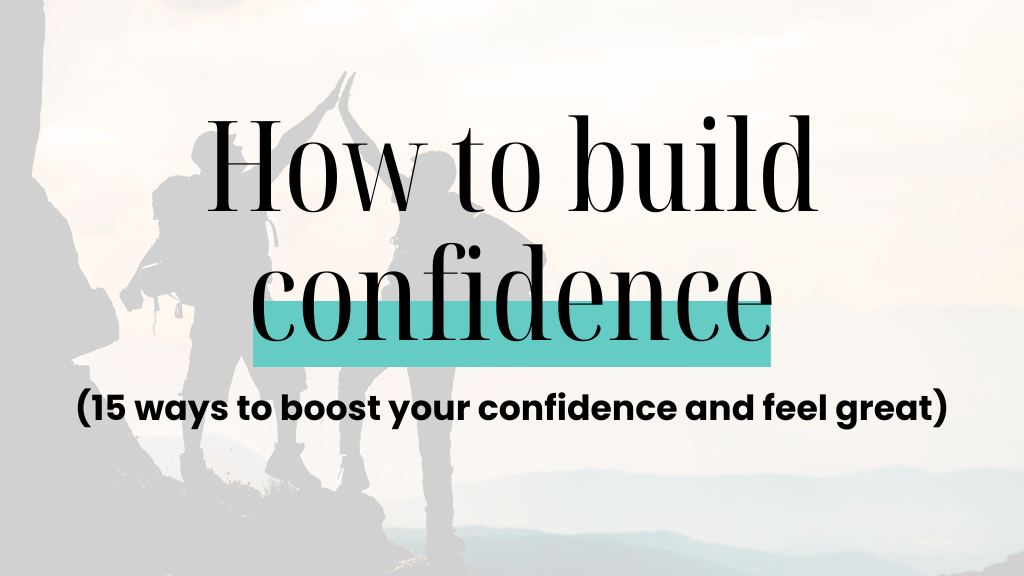
We all want to feel confident in who we are and what we’re capable of! The keys to building great, amazing self-confidence shouldn’t be a secret… so I’m sharing 15 ways to boost your self-confidence!
If you implement some or all of them consistently, you’ll be feeling more confident in 2 to 3 weeks already! Isn’t that amazing?
What is confidence?
Confidence is the feeling of being sure or certain of something or someone. Specifically, self-confidence is the feeling or state of being sure of yourself, your words, choices and actions. In other words, you know and trust your capabilities and feel comfortable expressing that.
Confidence is often context-specific, meaning you can feel confident in one situation, but lack confidence in another. For example, as a computer technician, you may feel confident of your ability to solve any computer-related problem. That confidence may even transfer into feeling comfortable or certain of your capabilities to deliver a short presentation on how to fix the 5 most common computer errors.
However, if someone were to ask you to help them heal from a trauma or explain the benefits of visualization, you would probably feel less confident. Why? Because you are not certain of your capabilities or knowledge in that field of expertise.
Can you learn to become more confident?
Yes, absolutely! Confidence is not a fixed, innate “thing” you have or don’t have. It is a skill that you need to practice and be aware of, especially when entering situations that you are not very familiar with.
Confidence has a lot to do with the story you tell yourself. In other words, your internal self-talk. When your internal self-talk is positive, uplifting and encouraging, you are more likely to feel confident.
Think of it like this: When you tell yourself a story filled with amazing, positive details and affirmations about your capabilities and worth, you’ll start to feel a lot calmer and a lot happier. Maybe even excited or inspired. Once you feel like that, you automatically feel a greater sense of confidence in your abilities and you feel more certain about the great outcome or result that you want. Showing up with more confidence will naturally lead to better results (I’ll dive further into that in a second)
And what happens if you start experiencing a string of good results? That’s right! You feel more confident!
I’ll explore how self-talk can help you feel more confident a little further down.
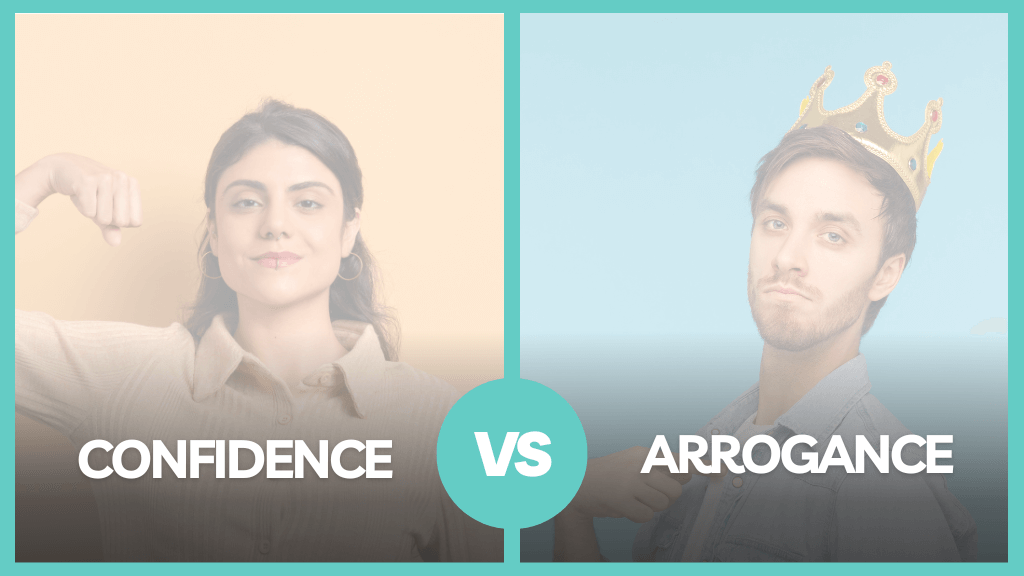
What’s the difference between confidence and arrogance?
There’s a fine line between confidence and arrogance, especially in social situations. If confidence is feeling sure about yourself and your capabilities, then arrogance is when you use that confidence or certainty to belittle, judge, hurt or make others feel bad.
Let me give you an example. Remember the computer technician I was talking about earlier… Well, he feels confident solving any computer-related problem. That’s perfectly okay, in fact, that’s what you want to see in a computer technician. However, if that computer technician belittles or makes his clients feel inferior because they don’t know how to fix the problem themselves or for creating the problem in the first place – that’s arrogance.
He has used his confidence to show how he is better or superior to someone else.
Confidence is pleasant, inspiring and heck, even attractive! Yet arrogance is often unpleasant and may lead to unfriendly interactions with others that end up hurting them or making them feel inferior.
How do you know if you have low self-confidence?
Confidence looks and feels different for every person, it even differs for the same person from situation to situation. Generally, you will know when you have low confidence when you start doubting yourself and your capabilities. When you’re low in confidence you may find yourself having more and more negative thoughts instead of positive, uplifting thoughts. The more you second-guess, change your mind or look for excuses, generally, the less confident you are because you lack the certainty that comes with confidence.
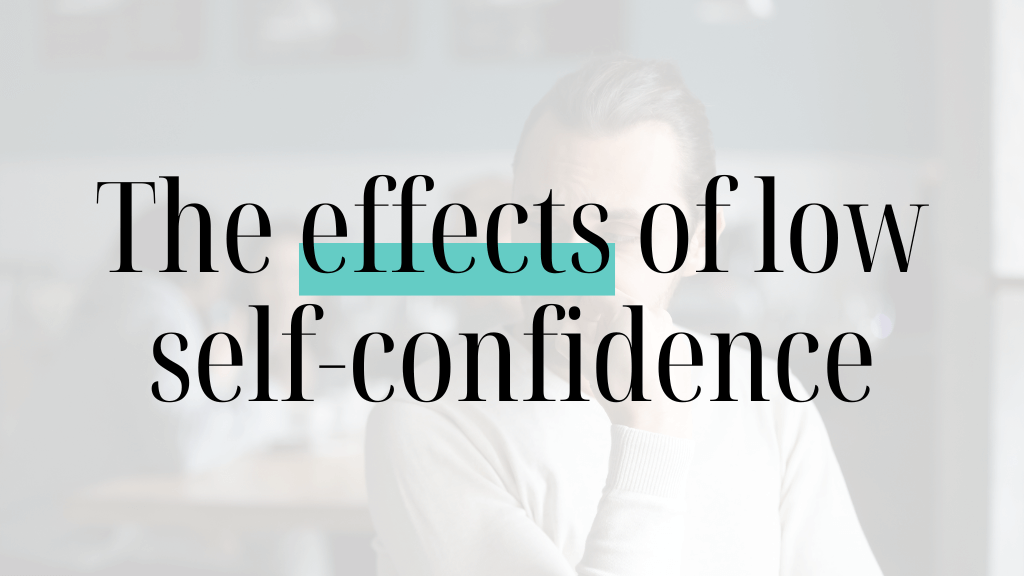
What are the effects and indicators of low confidence?
Some indicators of low confidence may include:
– Fear of failing or not performing to a good standard (A hockey player is worried about getting an opportunity to score a goal because he/she is afraid they might miss the shot)
– Constant negative self-talk about yourself or situations you find yourself in
– A lack of excitement for social situations or other situations where you have to present yourself and your capabilities (A public speaker with amazing self-confidence looks forward to his/her speaking engagements)
– Overall self-doubt and feeling “not good enough”.
– Feeling anxious about specific events in the future (being overly anxious or nervous about starting a job at a new school)
Low levels of confidence may also lead to:
– Constantly wanting to compare yourself to others (and generally feeling bad about it afterwards)
– A lack of healthy relationships (and often not feeling worthy of being in good relationships)
– Seeking other’s approval or validation (instead of creating positive internal self-talk, you look to others for motivation or encouragement first)
How do you build amazing self-confidence?
Luckily, there are several ways you can start to build amazing, great, positive self-confidence! I’ll be sharing 15 ways you can improve your confidence levels. They’re all accessible and if you implement them consistently, you’ll be feeling more confident, worthy and sure of yourself than ever before!
15 ways to build confidence and boost your self-esteem
Self-care
The more you value yourself, the more confident you’ll become. The best way to show your mind that you are valuable and worthy is to take care of yourself. After all, you don’t take care of things you don’t value, right?
Self-care can take many different forms. It doesn’t matter which one you pick as long as whatever you’re doing makes you feel great!
For some people, treating themselves at the nail salon gives them that kick of energy and confidence in themselves they need. For others, taking 5 minutes to drink their favourite kind of tea is just what they need.
Try out these examples of self-care:
– Going for a walk
– Listening to your favourite song before getting out of bed
– Cooking yourself a delicious meal
– Journalling
– Phoning a friend or loved one you’ve been disconnected from
– Take a nice, long shower
– Spend a few minutes in quietness imagining your dream holiday or house
Self-Talk
Self-talk refers to the stories, scenarios and possibilities that you create every single day in your mind. We’re constantly talking to ourselves, and for good reason. We need to plan, remind ourselves of our to-do list, encourage ourselves, and mentally explore possibilities before they occur.
As I mentioned earlier, a big chunk of your self-confidence comes from how you talk to yourself. When you consistently tell yourself great, amazing and positive stories about yourself and your life, you will start to feel more confident.
You are fully in control of your mind so take advantage of that! Great self-talk takes practice, believe it or not. It’s challenging sometimes to find the courageous and supporting words that inspire us to take on challenges or grow out of our comfort zone – but the reward is worth it!
Change your life by changing the story you tell yourself about your life.
Exercise (Taking care of your body)
One of the most beneficial things you can do for your overall mental and physical health is exercise. But let’s focus on how it can help you to build confidence.
Taking care of your body is another way of showing and teaching your mind that you care, that you are valuable and that you are worthy. Through regular exercise, you make a statement that you are proud of who you are and that you are willing to spend time to make yourself look and feel better – a sure sign of confidence!
Regular exercise also leads to an increase in mood, which improves your self-talk and outlook on life, which, in turn, boosts your confidence.
Once you see the results of regular exercise, your confidence will skyrocket. Not only will you have the knowledge that you spent hours putting in a lot of effort, but when those around you start to notice you and compliment you more, your confidence will shoot through the roof! What’s more, knowing that your mind and body can push through barriers and staying committed even when the process is challenging will help you continue to show up with confidence in other areas of your life.
Although regular exercise doesn’t directly increase confidence, the benefits of looking and feeling great will inevitably boost your confidence levels!
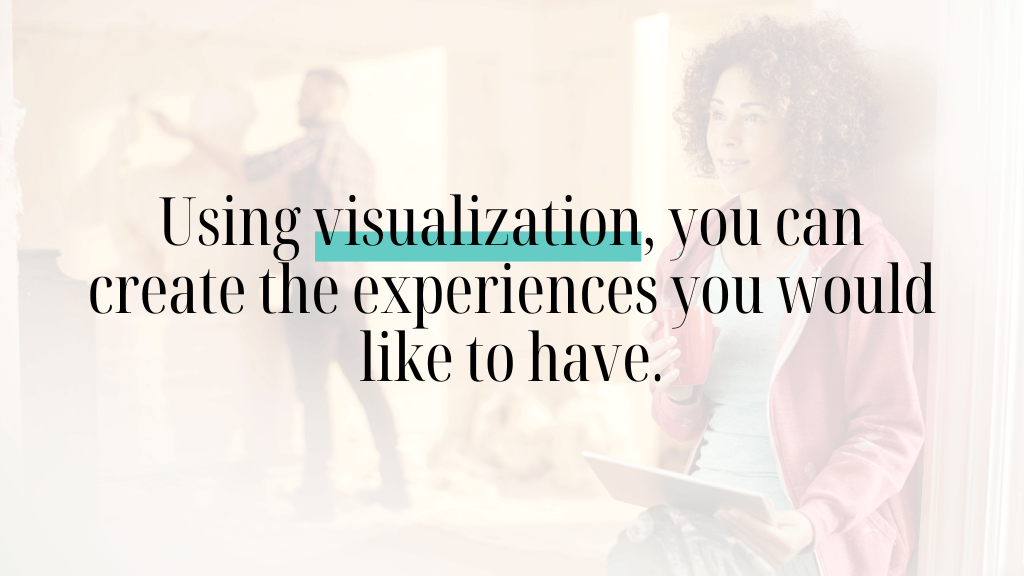
Visualization
Visualization is the act of creating a clear mental image of a future event. When done well, like with the help of a coach, it builds confidence, calm and a sense of control over the event and one’s emotions. Visualization has a whole range of benefits and will most certainly boost your confidence!
- It prepares your mind and body for what is to come.
- It allows you to explore different scenarios of future events and practice accordingly.
- It’s also an incredibly powerful tool for teaching your mind and body about what the outcome you would like to have looks and feels like.
A big part of the lack of confidence and fear of failure comes from the unknown. Not knowing “how you will do this” or “how you will achieve that”.
Using visualization, you can make the unknown, known, by creating the experiences you would like to have and practising them.
Visualization is an awesome way to prepare for presentations or speeches. You can visualize yourself delivering the perfect speech with confidence – comfortably and naturally. See yourself saying the right words at the right times and how they inspire and captivate your audience. Feel what it is like to have your audience clap and congratulate you, or when your sales pitch converts a prospect into a client!
Remember, your subconscious mind thinks in pictures, patterns and symbols. It also doesn’t know the difference between what’s real and what’s imagined (visualized). So teach it about the goals you would like to have so that it can help you attract those experiences.
Small Challenges
Setting yourself small challenges and overcoming them leads to a significant increase in confidence! The more you “win” or “succeed” by overcoming small challenges, the more you teach yourself and your mind that you can conquer any obstacle that stands in your way!
Instead of starting big, start small. Challenge yourself to do something you haven’t done before or find difficult, but that you know you can do if you apply yourself. Incorporate positive, affirming self-talk and visualize yourself overcoming the challenge! You don’t have to know HOW, WHEN or WHERE, just focus on the moment you have successfully overcome the challenge.
Conquering small obstacles builds your confidence because you become used to doing difficult things successfully. It builds certainty in your capabilities which is a major part of feeling confident. You also create a sense of accomplishment, so when a new, challenging situation comes along you can remind yourself of all the challenges you have conquered before.
Set Small Goals
Similar to setting small challenges, break your big goals or dreams into smaller, manageable goals. Let’s pretend your big goal is to run for 30 minutes every day. Break that down into smaller steps that are easier to achieve, so that you can build confidence. For example:
– Put on your exercise clothes every day for a week.
– If you’re not running currently, aim to just run once for any length of time.
– Aim to run 2 times a week for 10 minutes.
Continue increasing the size of the goals as your confidence in your ability to achieve them increases.
The more you focus on consistently achieving small goals, the more you build your confidence to take on bigger and more challenging goals!
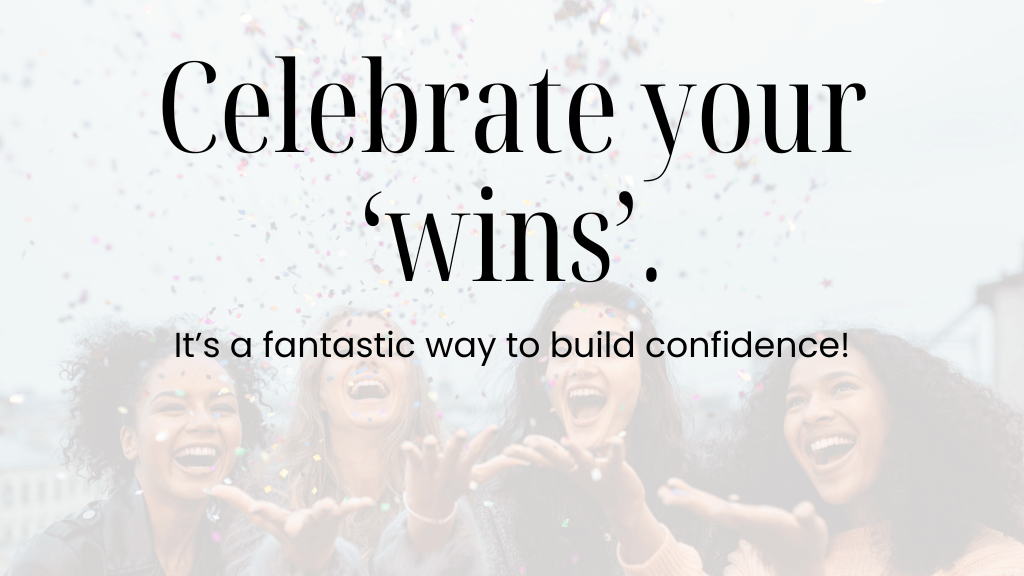
Celebrate your 'wins'
Celebrating your “wins” and successes is a fantastic way to build confidence! It’s another great way of showing yourself how truly amazing and worthy you are. Besides increasing your confidence and boosting your mood, Celebrating your ‘wins’ also benefits you in the following ways:
– Increased motivation
– Strengthened neural pathways that link to success
– More self-appreciation
– Increased ability to give and receive praise
Think of celebrating small wins like eating a piece of chocolate (if you like chocolate). The moment you bite into the chocolate you get this amazing ‘kick of deliciousness’ that makes you feel good and reinforces the idea that ‘chocolate tastes good’.
The same goes for your self-confidence. As soon as you achieve or accomplish something, no matter how small – celebrate it! It reinforces the idea that what you did was ‘good’ and teaches your mind and your brain that this is the kind of feeling of success you like. Inevitably, that leads to more self-confidence because you also condition yourself to appreciate the great things you do daily!
Celebrating your wins can take any form. I like to pretend I’m giving myself and my team of ‘me’s’ (Yes, I know how this may sound) a high-five. Others prefer to tell themselves “Congratulations” or “Well done!”. Choose a celebration that makes you feel great and that you could do almost anywhere at any time.
Daily Affirmations
The best thing you can do to start your day? Affirming to yourself all the positive qualities and characteristics that make you amazing. Affirmations build confidence because you are conditioning your mind to accept the version of yourself that you are affirming.
When creating your affirmations, make sure they:
– Are positive, yet authentic. If you imagine yourself embodying them it should feel ‘right’.
– Make you feel good! The key is in the wording. Instead of “I am happy”, say “I radiate joy in every moment of every day.” This is essential – if you cannot create a positive emotional response to the affirmation, it probably won’t work.
– Are phrased in the present tense. For example, “I feel”, “I have”, “I am”. Remove the words “want”, “will” or “will be”.
Bonus: Use my favourite affirmation because it makes me love and appreciate myself so much more and I want it to do the same for you!
“Whenever I look in the mirror I always smile. I know that this is who I am meant to be – and I LOVE IT!”
Embrace a Growth Mindset
There are very few things in life that are fixed. Your income can grow, your health can improve, relationships come and go and even your happiness fluctuates. So why should your mindset be any different?
There will be days when you feel amazingly confident – and you should take advantage of those! There will also be days where you feel tired, weaker and less confident than what you’re used to. Don’t blame or victimize yourself in those moments. Recognize that they are part of growing.
Confidence is not about never doubting yourself. If you push yourself to your limits often you are supposed to feel a little doubtful or scared sometimes. That’s completely normal and you should embrace that!
Confidence is about appreciating who you are and what you’re capable of, while simultaneously encouraging yourself to improve, to grow and be more than what you were yesterday!
Pursue what makes you Happy
When you’re happy, passionate and excited you do and say things that you wouldn’t normally. You also doubt your actions, choices and ideas a lot less because you know they come from a place of joy. Naturally, this leads to more confidence because you are already in the right state of mind.
Without knowing your current situation, a constant lack of confidence and increasing levels of self-doubt may be an indicator that you are not doing what you love or what makes you happy.
Pursuing activities and paths that truly make you happy will boost your confidence significantly because you will be feeling good most of the time. You’ll also have the certainty that you’re doing what you’re meant to be doing, giving you the confidence boost you need to overcome obstacles and challenges.
Embrace curiosity and making mistakes
Imagine how much fear and anxiety you will have when you place your entire self-worth on every action or choice you make. You may say or believe ideas like:
“If I don’t do this well, then I am a failure”
“What if I’m not good enough to succeed at this?”
“Maybe this isn’t such a good idea…”
Instead, when you embrace a sense of curiosity and become comfortable making mistakes, you realize that doubting yourself and doing things that scare you is a natural part of growing and learning. When you feel secure knowing that even when you make a mistake, it’s okay – you can go into anything with complete confidence because whether you ‘succeed’ or not, you know that you will come out the other side a better person.
In the immortal words of Hannah Montana (I can’t believe I’m saying this…)
“Everybody makes mistakes, everybody has those days.”

Read books & listen to experts
We’ve established that certainty of yourself and your capabilities leads to confidence, right?
So one effective way to increase your certainty in yourself and your capabilities, thereby building your confidence, would be to learn as much as possible about the activity or situation that scares you.
If you’re feeling low in confidence because you have to present an idea to an audience, prepare for this and give yourself a confidence boost by learning all you can about public speaking. Watch videos or listen to experts talking about important concepts and ideas related to giving presentations.
Then, visualize and practice embodying and executing that knowledge in your presentation. Combine these 2 elements and you’ll start to build your confidence and expand your knowledge base!
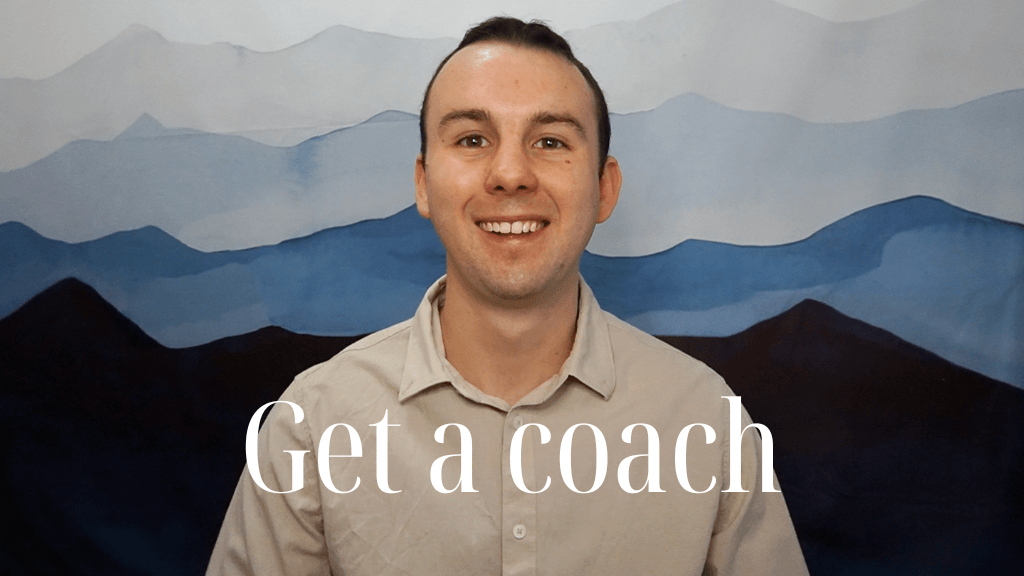
Get a Coach
Often, we’re extremely unaware of the factors that are contributing to our perceptions and problems. Because we spend ALL OUR TIME living life through our perspective, we forget that others may see the world differently.
Sometimes a change in perspective is all we need. Maybe you only need someone to challenge you to the point where you stand up for yourself and say “Hey, I can do this!”
What a show of confidence, right?
A great coach is an expert at helping you uncover and unpack all the limiting ideas, beliefs and emotions that cause you to feel low in confidence. From there, you can work with your coach to overcome those limitations and build great, amazing, positive and powerful self-confidence.
If you were to work with me on your confidence, It would look something like this:
- Uncover and unpack all the limiting ideas, beliefs and emotions that make you to feel low in confidence.
- Once we know the root causes, we can use incredible techniques like Negative Belief Therapy™ and Negative Emotional Therapy™ to let go and get rid of each of the limiting beliefs and emotions in around 30 minutes.
- We can also use these same processes to give you powerful reminders so that next time you even feel like you want to feel low in self-confidence, you know EXACTLY what you need to say and do to get yourself in a confident state.
- Finally, I’d help you anchor in an amazing sense of confidence and all the qualities you would like to embody in key situations that are important to you. The Bang Pattern™ is unrivalled at doing this successfully and quickly!
If you are considering it (I know you want to 😉,book a free session with me or contact me to learn more or take the next step.
Stop comparing yourself to others
This is probably the most challenging one of all, right? You might find great comfort in comparing yourself to others, but comparison also kills your self-worth and confidence.
It’s perfectly normal and encouraged to track your progress against others for self-improvement, but not for self-degradation. When you stop comparing yourself to others you realize that your true value and worth comes from loving and accepting yourself for who you are. With that sort of knowledge, you have the foundation to feel confident and act confidently in any situation because deep down, you fully know and APPRECIATE who you are.
The less you compare yourself to others, the more confident you will feel, mostly because your focus will be on your self-worth alone, instead of on the worth of others.
Finally, realize that building confidence is a journey. I find it’s best to embrace the steps on the journey fully and openly, knowing that it’s not all about how confident you are, but rather about creating a life that’s meaningful and fulfilling to you. Take comfort in the knowledge that you are willing and capable of doing whatever it takes to create the life you deserve.
And that… that’ true confidence!
Conclusion
Finally, realize that building confidence is a journey. I find it’s best to embrace the steps on the journey fully and openly, knowing that it’s not all about how confident you are, but rather about creating a life that’s meaningful and fulfilling to you. Take comfort in the knowledge that you are willing and capable of doing whatever it takes to create the life you deserve.
And that… that’ true confidence!
